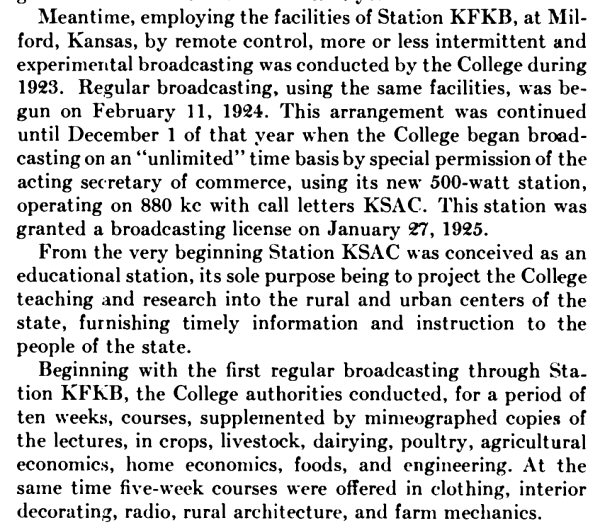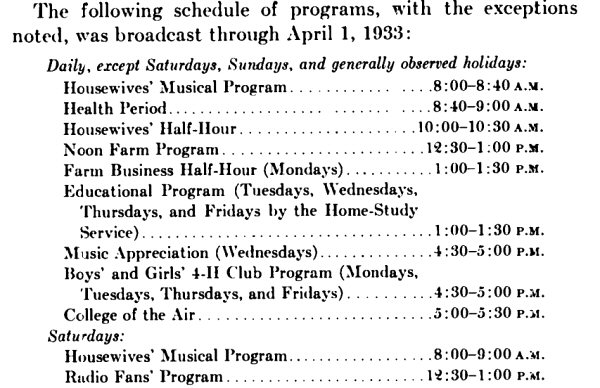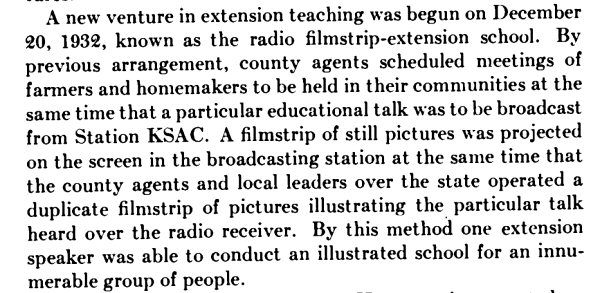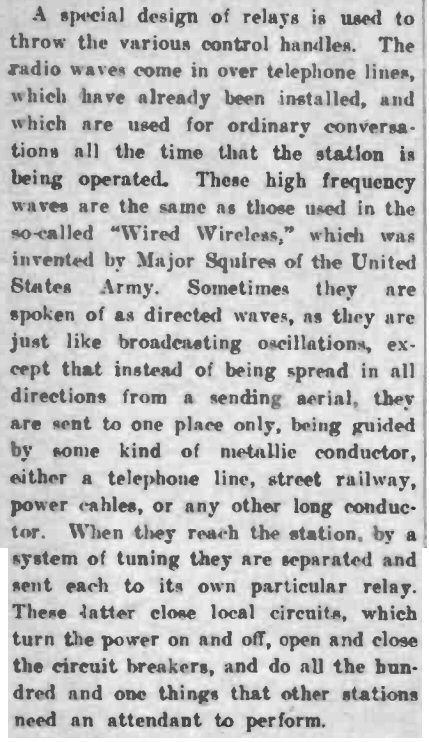Sunday, January 28, 2018
Unafraid of corporate influence
A Canadian prof is complaining about corporate influence in higher education. He's got it backwards twice. Corporate influence is NOT the problem, it's the solution; and corporate influence is NOT growing, it's shrinking. The valid parts of higher education (medicine, agriculture, business, engineering) have ALWAYS maintained connections with the commercial sector. They are paid to train employees and solve problems FOR business, and they often succeed. Unfortunately the useless parts of higher education, the parts that CREATE problems for the rest of society, have more influence with administrations and accrediting agencies and foundations, so the SOLVING part has to fight for its existence.
= = = = =
This 1935 book lists all licensed educational broadcasters as of 1935. There are 200 listings. About half of the licenses never went anywhere; a group of students at some college or high school acquired a license then lost interest or graduated. About half of the licenses were purchased by local businesses who turned the station commercial. Many of those commercial stations are still on the air now. Only a dozen were truly active as educational broadcasters in 1935, and a few of them are still running now.
Among the choice few is KSAC in Manhattan. I knew something about KSAC because I did a summer internship there in 1962. Here's a piece of its history I hadn't heard before:
 KFKB in Milford was JR Brinkley's station. It was among the most powerful in the country, so KSAC began life in a big way. JR was a major vendor of hooey. Goat gland surgery and a collection of magic elixirs. I can't properly classify him as harmless hooey. Surgery is always harmful and sometimes fatal; it should be used only when the likely good exceeds the likely harm. Brinkley's goat glands did no good at all.
Nevertheless, K-State wasn't afraid of using Brinkley's studios to GET SHIT DONE, even though Brinkley was immoral and illegal. Brinkley's high power enabled K-State to establish a national footprint quickly. When KSAC got its own transmitter, it had an immediate audience for programs like these....
KFKB in Milford was JR Brinkley's station. It was among the most powerful in the country, so KSAC began life in a big way. JR was a major vendor of hooey. Goat gland surgery and a collection of magic elixirs. I can't properly classify him as harmless hooey. Surgery is always harmful and sometimes fatal; it should be used only when the likely good exceeds the likely harm. Brinkley's goat glands did no good at all.
Nevertheless, K-State wasn't afraid of using Brinkley's studios to GET SHIT DONE, even though Brinkley was immoral and illegal. Brinkley's high power enabled K-State to establish a national footprint quickly. When KSAC got its own transmitter, it had an immediate audience for programs like these....
 ... which were still being offered in the '60s when I listened and briefly worked there. All aimed at SOLVING REAL PROBLEMS for real farmers and housewives.
Here's another neat innovation:
... which were still being offered in the '60s when I listened and briefly worked there. All aimed at SOLVING REAL PROBLEMS for real farmers and housewives.
Here's another neat innovation:
 Low-tech courseware!
The mention of 'remote control', if accurate, is also interesting. Did KSAC's student engineers rig up a way to send commands and programs to Milford by telephone?
= = = = =
Later: Here's a more detailed description of a similar remote operation at about the same time. This was an electrical power substation in Indiana, controlled by phone from the main plant.
Low-tech courseware!
The mention of 'remote control', if accurate, is also interesting. Did KSAC's student engineers rig up a way to send commands and programs to Milford by telephone?
= = = = =
Later: Here's a more detailed description of a similar remote operation at about the same time. This was an electrical power substation in Indiana, controlled by phone from the main plant.

 KFKB in Milford was JR Brinkley's station. It was among the most powerful in the country, so KSAC began life in a big way. JR was a major vendor of hooey. Goat gland surgery and a collection of magic elixirs. I can't properly classify him as harmless hooey. Surgery is always harmful and sometimes fatal; it should be used only when the likely good exceeds the likely harm. Brinkley's goat glands did no good at all.
Nevertheless, K-State wasn't afraid of using Brinkley's studios to GET SHIT DONE, even though Brinkley was immoral and illegal. Brinkley's high power enabled K-State to establish a national footprint quickly. When KSAC got its own transmitter, it had an immediate audience for programs like these....
KFKB in Milford was JR Brinkley's station. It was among the most powerful in the country, so KSAC began life in a big way. JR was a major vendor of hooey. Goat gland surgery and a collection of magic elixirs. I can't properly classify him as harmless hooey. Surgery is always harmful and sometimes fatal; it should be used only when the likely good exceeds the likely harm. Brinkley's goat glands did no good at all.
Nevertheless, K-State wasn't afraid of using Brinkley's studios to GET SHIT DONE, even though Brinkley was immoral and illegal. Brinkley's high power enabled K-State to establish a national footprint quickly. When KSAC got its own transmitter, it had an immediate audience for programs like these....
 ... which were still being offered in the '60s when I listened and briefly worked there. All aimed at SOLVING REAL PROBLEMS for real farmers and housewives.
Here's another neat innovation:
... which were still being offered in the '60s when I listened and briefly worked there. All aimed at SOLVING REAL PROBLEMS for real farmers and housewives.
Here's another neat innovation:
 Low-tech courseware!
The mention of 'remote control', if accurate, is also interesting. Did KSAC's student engineers rig up a way to send commands and programs to Milford by telephone?
= = = = =
Later: Here's a more detailed description of a similar remote operation at about the same time. This was an electrical power substation in Indiana, controlled by phone from the main plant.
Low-tech courseware!
The mention of 'remote control', if accurate, is also interesting. Did KSAC's student engineers rig up a way to send commands and programs to Milford by telephone?
= = = = =
Later: Here's a more detailed description of a similar remote operation at about the same time. This was an electrical power substation in Indiana, controlled by phone from the main plant.

Labels: Alternate universe, Experiential education
